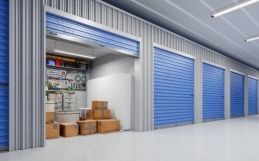Self Storage has grown to a multi-billion dollar business worldwide; from humble Australasian beginnings in Western Sydney in the late 70’s, Self Storage sites businesses are just about everywhere!
But what goes on behind those big fortress styled walls or big roller doors?
Self Storage or Mini Storage as some call it, is personal or business Storage in various sizes. Usually, a steel partitioned box, with a secure door the average size about 10 square metres or half a garage. These spaces cost anywhere from $150 – $250 a month, depending on location.
Sizes range from lockers right up to commercial size spaces, often 3 metres wide and up to 12 metres deep.
Some have lots of headroom but typically about 2.5 metres high. Self Storage spaces are available by way of an “agreement” or licence to use the space.
Self Storage offers a flexible Storage agreement not offered by traditional commercial lease agreements. Storers can upsize and downsize to suit their storage needs and as the terms is flexible, Storage costs can remain only for the term needed.
Storage spaces can be booked online or you can phone in and speak to the friendly staff who will assist with your Storage requirements.
Items that are flammable or dangerous cannot be stored. Animals, plants and people are a no no!
Typically, Storers move their own goods into their booked space and if need be removalists can undertake this task for you






